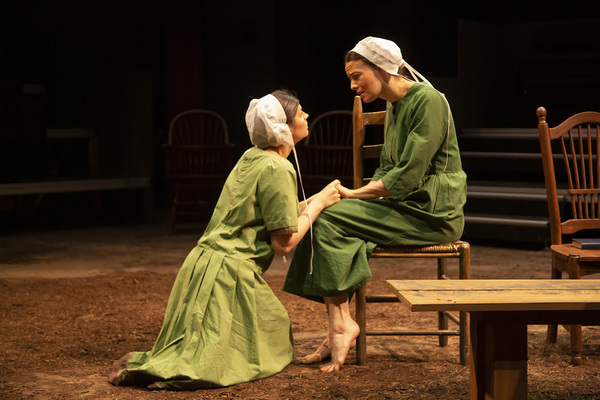At WaterTower Theatre, Chelsea Marcantel’s Everything is Wonderful gets a beautifully acted and staged production.
by Jill Sweeney | April 27, 2019

(photo credit: Jason Anderson)
“For Amish and Mennonites, the struggle to die to self was life-long. God’s power was released only when the individual did not exercise his own will… membership in the community and participation in its rites was the means to salvation. God did not grant salvation because of inner experience. Salvation came only by actual participation in Christ, by suffering, yielding, dying to self as he did. They believed this was possible only in community and through the Ordnung.”
— Sandra Cronk, Gelassenheit: The Rites of the Redemptive Process in Old Order Amish and Old Order Mennonite Communities, Mennonite Quarterly Review 1981
“Dear Ones,
Trusting in God’s ways, how does this find you? Hope all in good health and in good cheer. Around here we are all on the go and try to make the best we can. I always wonder if we take enough time with our children. Wishing you the best with your little one and the unknown future. I think of you often. Keep looking up; God is always there.
Sincerely,
Martin and Mary Schwartz”
— Letter from the Schwartz Family to Chandler Gerber, From One Second to the Next, Directed by Werner Herzog, 2013.
Addison — Gelassenheit: it’s probably a key concept to understanding the Amish. Translated, it most frequently appears as “yieldedness,” a full-hearted submission to God’s will. Every element of Amish life, every rule and restriction, is geared towards generating this submission. So, to understand why a father could break bread with the man who murdered two of his sons through carelessness, but won’t speak to his own daughter for the sin of leaving the Amish community after being baptized, you have to get the essential Gelassenheit of it all. Chelsea Marcantel’s Everything is Wonderful, based in part on the deaths of three members of the Schwartz family caused by a young man named Chandler Gerber who was texting and driving, is a deep dive into a community that most of us know little about, above Harrison Ford and barn raisings anyway. But despite how alien the community may seem at first glance, the play pulls the audience past the outward trappings into the humanity below, without ever losing sight of the contradictions in its beliefs. It’s a challenging piece, in the best of ways, and Watertower Theatre’s production has assembled a dream team of local talent that more than rises to meet that challenge.

(photo credit: Jason Anderson)
A young man trudges up the road towards a simple farm house, where an older Amish couple sits on the front porch. He introduces himself; they know who he is, from the hospital. This, then, is Eric (Seth Magill), the young man who drove the car that killed their sons, Levi and Joshua. He’s come to apologize—again—for his actions, and to beg them to press charges; he wasn’t drunk, but he wasn’t sober either. The dead boys’ mother, Esther (Jenny Tucker), is silent. But the father, Jacob (Steven Pounders), makes a decision: Eric should stay, sleep in their barn, wear their dead sons’ clothes, work on the land, and try and find some sort of peace. Jacob’s choice to take Eric in baffles not only his wife and neighbors, particularly Abram (who Eric dubs “the LeBron James of being Amish”), but also Jacob and Esther’s estranged eldest daughter, Miri (Kelsey Milbourn). Miri (short for Miriam), excommunicated for choosing to leave her community after being baptized into it as an adult, has returned to comfort her parents and baby sister Ruth (Haley Evans) after her brothers’ death, hardly expecting that on arrival she’d be sent to sleep in the barn with their murderer. As tempers flare and mysteries are unraveled, all the characters must confront what forgiveness really means, and to whom we owe it.
Everything is Wonderful is a true ensemble piece; every character is rich, real, and layered. So it’s fortunate that Watertower’s cast, under the firm hand of director (and WTT Associate Artistic Director) Kelsey Leigh Ervi, is an embarrassment of riches.
Kelsey Milbourn’s Miri is a revelation; while lighting and sound elements are used to signify scenes taking place in the past, they’re redundant in Milbourn’s case. Milbourn’s physicality expertly differentiates between the Miri of the past—open, girlish, charming—and the Miri of now—wounded, anxious, closed-off—and you ache for her confusion and rage. No less wonderful is Steven Pounder’s performance as Jacob, who, though placid on the surface, struggles to accept that God has a plan in taking three of his four children away, in one form or another: “What did I owe God,” he laments, “that he needed such repayment?” Scenes between the two crackle with tension and yearning. Magill plays an interesting shell game with Eric—you know he isn’t as at peace with himself as he wants you—and himself—to believe, but when he finally cracks, it feels somewhat abrupt. But he’s a surprisingly warm, charming presence, in a part that could go very, very badly in a lesser actor’s hands.
Tucker’s Esther is a slow burn; seemingly stoic and willing to accept her husband’s decision to take Eric in, she erupts into unexpected violence when alone, and her agony over Miri’s loss, and the part she played in it, is palpable. In a play with no heroes per se, there are also no villains, though Abram walks a fine line in that respect; McNamara’s on a real tightrope walk to keep the audience empathizing with his humanity while still letting just enough of his arrogance and menace show through. And finally, in another role that might turn saccharine in less careful hands, Haley Evans’ as Ruth glows with warmth and innocence.

(photo credit: Jason Anderson)
There’s a sense upon entering the theater that you’re looking at the aftermath of a disaster—burned beams, a dirt floor, overturned chairs at a simple dining room table. And so it should be; the family has been through a disaster, and now they must live in the wreckage. It’s a simple, but devastatingly effective design by Donna Marquet, and it works seamlessly with the lighting (Leann Burns) and sound (Ryan Swift Joyner) designs to evoke a sense of place not only in the present but in the past as well. The costume design (Becca Janney) is, by nature of the setting, somewhat limited in scope; but the subtle grace notes come through, like the contrasts between the shades of green worn by the play’s three women—light, springy green for Ruth, a bold, bright emerald for Miri before she’s forced out, and a somber forest green for Esther.
This production, and the two that follow (the musical The Ballad of Little Jo and one-woman show Unveiled) seemingly mark the end of an era at Watertower, following the controversy that surrounded former Artistic Director Joanie Schultz’s resignation. After a slew of groundbreaking and diverse, but at times divisive, productions, Watertower’s next season, just announced by new Producing Artistic Director Shane Peterman, is full of more broadly popular pieces. Fingers crossed that they’ll be as well-crafted and beautifully performed as Everything is Wonderful.






